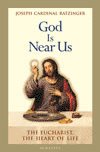But in a collection of articles, homilies, and lectures on the Eucharist which Ignatius Press published under the title, God Is Near Us, Pope Benedict has this to say about thanksgiving to God in the old Covenant being continued in the new Covenant:
 "The heart of Israel's worship has always been what we express in the Latin word memoriale: remembrance. Whenever the Passover is celebrated, before the lamb is eaten, the head of the household recites the Passover Haggadah, that is to say, an account praising the great works God has done for Israel. ...
"The heart of Israel's worship has always been what we express in the Latin word memoriale: remembrance. Whenever the Passover is celebrated, before the lamb is eaten, the head of the household recites the Passover Haggadah, that is to say, an account praising the great works God has done for Israel. ...It was into the texture of the Passover Haggadah, this thanksgiving prayer, that Jesus wove his sayings at the Last Supper, ... The Canon of the Roman Mass developed directly from these Jewish prayers of thanksgiving; it is the direct descendant and continuation of the prayer of Jesus at the Last Supper and is thereby the heart of the Eucharist. It is the genuine vehicle of the sacrifice, since thereby Jesus Christ transformed his death into verbal form - a prayer - and, in so doing, changed the world. ...
Because he turned death into a proclamation of thanksgiving and love, he is now able to be present down through all the ages as the wellspring of life, and we can enter into him by praying with him. ... The magnitude of Christ's achievement consists in precisely in his not remaining someone else, over and against us, who might thus relegate us once more to a merely passive role; he does not merely bear with us; rather, he bears us up; he identifies himself with us to such an extent that our sins belong to him and his being to us: he truly accepts us and takes us up, so that we ourselves become active with his support and alongside him, so that we ourselves cooperate and join in the sacrifice with him, participating in the mystery ourselves. Thus our own life and suffering, our own hoping and loving, can also become fruitful, in the new heart he has given us." (God Is Near Us, pp.49-50)
No comments:
Post a Comment